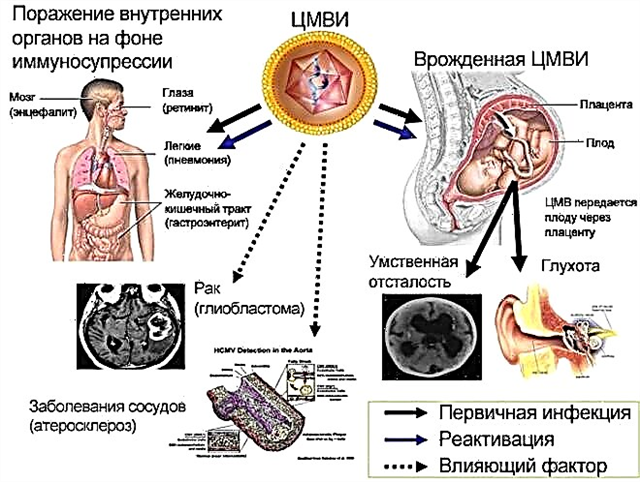
The child has cytomegalovirus. Despite the wide distribution of this agent around the planet, there is practically no knowledge of him in ordinary people. In the best case, someone has heard something, but what exactly can no longer be remembered. Doctor Yevgeny Komarovsky told in an accessible form that it is a virus, how it is dangerous and what to do if this "terrible beast" was found in the child's blood tests. We give you the opportunity to get acquainted with the information from a renowned doctor.
About the virus
Cytomegalovirus belongs to the family of herpes viruses of the fifth type. It is quite interesting when viewed through a microscope - its shape resembles a round barbed shell of chestnut fruit, and in section it looks like a gear.
Affecting humans, this virus causes a cytomegalovirus infection. However, he is not so aggressive: after getting into the body, he can quite peacefully exist there for a long time, without indicating his presence in any way. For this "tolerance" it is called a conditionally pathogenic virus, which goes into reproduction and causes disease only under certain factors. The main one is a weakened immune system. The most susceptible to infection are people who take a lot of medicines for any reason, living in an ecologically polluted area, often using household chemicals in large quantities.
Cytomegalovirus loves to settle in the salivary glands. From there, he travels throughout the body.
By the way, the body gradually develops antibodies to it, and if there are enough of them, even a weakened immunity can no longer cause a cytomegalovirus infection.

Transmission routes
If for adults the main route of infection is sexual, then for children it is kissing, contact with the saliva of a person infected with the virus, therefore it is sometimes called the kissing virus.
Also, a mother, a large cytomegalovirus infection, transmits it to the fetus during pregnancy, and this can cause quite serious malformations in its development. A baby can become infected during childbirth through contact with the mucous membranes of the birth canal. In addition, the baby can get an infection in breast milk in the first days of his life.
Another way of transmission of cytomegalovirus is blood. If the crumbs had replacement blood transfusions from a donor who has such a virus, as well as organ transplant operations from an infected donor, then the child will definitely become carriers of cytomegalovirus.
The danger
Evgeny Komarovsky cites the following fact: on the planet, 100% of elderly people in one way or another had contact with cytomegalovirus. Among adolescents, about 15% of those who already have antibodies to this agent are found (that is, the disease has already been transferred). By the age of 35-40, antibodies to CMV are found in 50-70% of people. By retirement, the number of people immune to the virus is even higher. Thus, it is rather difficult to talk about some kind of excessive danger of the fifth type virus, because many who have recovered do not even know about such an infection - it passed completely unnoticed for them.
The virus is dangerous only for pregnant women and their unborn children, but also on condition that the collision of the expectant mother with CMV during gestation arose for the first time. If a woman was previously ill, and antibodies were found in her blood, then there is no harm to the child. But primary infection during pregnancy is dangerous for the baby - he may die or the risk of congenital malformations is high.
If the baby is infected during pregnancy or immediately after childbirth, then doctors talk about congenital cytomegalovirus infection. This is a pretty serious diagnosis.

If a child has caught the virus already in his own conscious life, they talk about an acquired infection. It can be overcome without much difficulty and consequences.
Parents most often ask the question: what does it mean if antibodies to cytomegalovirus (IgG) are found in the blood test of the baby and + is set opposite CMV? There is nothing to worry about, says Yevgeny Komarovsky. This does not mean that the child is sick, but suggests that there are antibodies in his body that will prevent cytomegalovirus from doing its "dirty deed". They developed independently, since the child had already had contact with this virus.
You need to start worrying if the child has IgM + in the blood test results. This means that the virus is in the blood, but there are no antibodies yet.

Infection symptoms
The presence of cytomegalovirus infection in a newborn is determined by the doctors of the children's department of the maternity hospital. They do an extended blood test immediately after the baby is born.
In the case of an acquired infection, parents should be aware that the incubation period lasts from 3 weeks to 2 months, and the disease itself can last from 2 weeks to one and a half months.
Symptoms even in a very attentive mother will not cause the slightest doubt and suspicion - they are very reminiscent of an ordinary viral infection:
- body temperature rises;
- respiratory symptoms appear (runny nose, cough, which quickly turns into bronchitis);
- signs of intoxication are noticeable, the child has no appetite, he complains of headaches and muscle pains.
If the child's immune system is all right, then it will give a powerful rebuff to the virus, its spread will be stopped, and the very IgG antibodies will appear in the baby's blood. However, if the toddler's own defense was not enough, the infection can "hide" and acquire a sluggish, but deep form, in which the internal organs and the nervous system are affected. With the generalized form of cytomegalovirus infection, the liver, kidneys and adrenal glands, and the spleen are affected.
Treatment
It is accepted to treat cytomegalovirus infection by analogy with herpes infection, except that drugs are chosen that do not affect herpes in general, but cytomegalovirus in particular. There are two such funds - "Ganciclovir" and "Cytoven", both are quite expensive.
During the acute phase of the disease, a child is prescribed an abundant drink, taking vitamins. For uncomplicated CMV infection, antibiotics are not needed because antimicrobial drugs do not work against viruses.
Antibacterial agents can be prescribed by a doctor in case of a complicated course of the disease, when there are inflammatory processes from the internal organs.
Prevention
The best prevention is strengthening of immunity, good nutrition, hardening, playing sports. If a pregnant woman did not suffer from cytomegaly and when she is registered, antibodies to this virus are not detected, then she will automatically fall into the risk group.
This virus is young (it was discovered only in the middle of the 20th century), and therefore poorly understood. To date, the effectiveness of the experimental vaccine is about 50%, that is, half of the vaccinated pregnant women will still get CMV.


To learn more about cytomegalovirus infection, the video of Dr. Komarovsky will help you.



